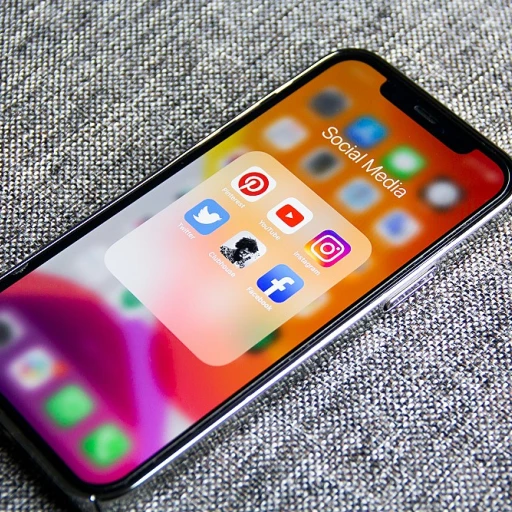
The symbiotic relationship between technology innovators and influencers
How tech visionaries and social media icons create trends together
The digital era has ushered in an unprecedented bond between those who engineer technology and the personalities that promote it online. It's a partnership that's reshaping the way we conceive of product innovation and market influence. Consider the recent collaboration between major tech brands and high-profile influencers; these alliances are often instrumental in transforming technical gadgets into cultural phenomena. After all, social media influencers bring a crucial element to the table: relatability.
Statistics reveal that influencer endorsements can lead to a significant increase in user engagement and sales. A report by Business Insider Intelligence estimates that the influencer marketing industry is set to grow to approximately $15 billion by 2022. Moreover, influencers are pivotal in translating the often complex language of tech features into everyday benefits that resonate with their followers.
Let's not forget the human element they introduce. Influencers provide personalized narratives and experiences around technological products, which fosters a sense of trust and community among their audience. This is particularly true when influencers utilize the very technology they are promoting, offering live demonstrations and real-time discussions through platforms like Twitch or YouTube.
For instance, when a new smartphone hits the market, it's not merely the specs that capture the public's attention. It's the way influencers integrate these devices into their lives, telling a story that connects with their followers on a personal level. An influencer's endorsement often carries more weight than traditional advertising because it comes across as a trusted recommendation from a friend rather than a corporate sales pitch.
It is clear that technology companies are recognizing the impact of influencers on their product lifecycles. This has led to savvy collaborations where influencers receive early access to gadgets or exclusive updates about the latest features, empowering them to create authentic content that stirs curiosity and conversation among their fanbase. A study by The Influencer Marketing Hub in 2021 highlights that 90% of respondents believe influencer marketing to be an effective form of marketing.
Additionally, influencers' expansive reach and ability to pivot quickly in response to market trends make them valuable allies in the ever-evolving tech industry. Their feedback can also become a formative element in the development cycle, offering insights that help shape future versions of products.
Influencer-led storytelling: a game-changer in tech communication
Storytelling in tech isn't new, but when influencers adopt this method, it brings a new layer of engagement to the product narrative. Unlike static ads, influencer storytelling is dynamic and interactive. It provides a platform for followers to ask questions, give feedback, and see the product in action, forging a closer connection between the consumer and the innovation.
The perpetual quest for the next big thing means tech brands are eager to partner with influencers who embody the future-forward ethos of their products. These partnerships go beyond mere product promotion—they involve crafting a narrative that positions both the brand and the influencer as pioneers at the cusp of the latest technological advancements.
Through strategic storytelling and engagement, influencers hold the key to unlocking new markets and demographics, paving the way for broader adoption of emerging tech. They are not only essential in generating excitement around new products but also in sustaining interest and loyalty long after the initial launch hype has died down.
For a deeper understanding of strategic partnerships in the tech and gaming industry, explore the analytical piece titled mastering influence in tech and gaming, which delves into the significance of influencer engagement in this niche market.
Interactive gaming experiences as a springboard for online engagement
The rise of interactive gaming in online communities
In an increasingly digital age, interactive gaming has become a key driver for engagement across social media platforms. The immersive nature of games has not only attracted players but has also given rise to communities where shared experiences and narratives are highly valued. For instance, live-streaming platform Twitch reported a 44% increase in viewership hours between 2020 and 2021, reflecting the growing interest in gaming content.
Influencers as the bridge between games and audiences
Influencers play a pivotal role in amplifying these interactive experiences, often serving as the bridge between gamers and the wider online audience. With the advent of platforms like Twitch and YouTube Gaming, influencers have the tools to broadcast engaging content that resonates with viewers. A study by Google highlights that 70% of gamers are motivated to purchase games after seeing them featured by YouTubers or streamers. The personal connection that influencers foster with their audience is a significant factor for this impact.
Benefits of interactivity in audience retention
Games that incorporate interactive elements also tend to see better retention statistics. Engaging audiences in real-time polls, decision-making processes, or simply allowing them to contribute to the storyline have proven to be effective ways to keep viewers involved. As detailed by a SuperData research report, interactive streams have a higher likelihood of retaining viewership, leading to longer watch times and increased loyalty.
Case studies of successful partnerships between game developers and digital celebrities
Collaborations paving the way for interactive engagement
The landscape of online interaction has been vastly altered by collaborations that fuse the creative prowess of game developers with the charismatic presence of digital influencers. Take, for instance, the rapport between 'Epic Games' and prominent streamers which catalyzed the rise of 'Fortnite'. This union not only spotlighted the game but also bolstered the streamers' notoriety. Such alliances exemplify the symbiotic potential within this industry, marrying tech innovation with the influential power of personal branding.
Strategic partnerships breathing life into virtual worlds
Strategic partnerships between gaming franchises and influencers also demonstrate a fascinating evolution of marketing strategies. An eloquent example is the enduring association between 'CD Projekt Red' and several YouTube personalities preceding the launch of 'Cyberpunk 2077'. These content creators were granted early access, generating anticipation and directly influencing consumer behavior through their gameplay experiences and reviews. This interaction underscores the strategic value influencers hold in animating and authenticating virtual environments for their viewers.
Driving immersive tech experiences through influencer insights
Influencers possess the unique aptitude to grant their followers a vicarious experience through emerging technology. By integrating insights into the allure of social media engagement, they contextualize and humanize tech advancements. The significant role influencers played in the viral success of augmented reality games such as 'Pokémon GO' is a testament to this dynamic. Their content rendered the tech more accessible and enticing, bridging the gap between intricate innovation and mainstream media consumption.
Influencers' role in early adoption and hype generation of new technology
The pivotal role influencers play in technological trends
In the realm of social media influence, influencers are often the harbingers of new technologies, their adoption setting the stage for widespread acceptance and excitement. A notable illustration of this phenomenon is the rise of virtual reality gaming. Here, influencers don’t just promote products post-launch; they're instrumental from the onset, nurturing early intrigue and acceptance within their networks.
Industry insiders point out that influencer partnerships have proven effective at driving consumer interest in nascent tech. For example, when a new gaming console is on the horizon, it's not uncommon to witness influencers sharing 'first look' content, teasing functionalities, and thus, creating buzz. These strategic pre-launch campaigns can dramatically spike consumer demand, exemplified by the rush for new console pre-orders following influencer showcases.
Statistics from marketing studies further corroborate the impressive impact influencers have. Reports suggest that products mentioned by influencers can see user engagement rates increase by up to 30%, which is a testament to the trust their followers have in their opinions.
In the context of gaming, influencers are especially potent. A streamer broadcasting a new game can compel thousands, if not millions, to either purchase the game or at least add it to their wishlist, demonstrating the power of personal endorsement over traditional marketing.
Yet, it's not always smooth sailing. With great influence comes great responsibility, and controversies have emerged regarding the transparency of such promotions. As influencers toe the line between enthusiasts and advertisers, regulatory bodies are stepping up to ensure disclosure practices are adhered to, safeguarding the authenticity that the influencer market is built upon.
The psychological appeal of gaming influencers to various audience demographics
Understanding the draw of gaming influencers
The world of gaming influencers is diverse, encompassing a wide range of personalities that appeal to various age groups, lifestyles, and interests. This diversity is not just a happenstance; it's rooted in the psychological appeal these influencers have on different audience demographics. For example, a survey by Pew Research found that 97% of boys ages 13 to 17 play video games, which suggests that male teens are significantly represented in the gaming community. Meanwhile, a report by the Entertainment Software Association in 2020 revealed that 41% of gamers are women, indicating that the industry's reach across genders is broader than stereotypes suggest.
The role of relatability and authenticity
At the heart of a gaming influencer's appeal is their ability to establish relatable and authentic connections with their viewers. These influencers share their genuine reactions and experiences, building trust with an audience that values sincerity over polished presentations. For instance, a streamer failing and then successfully overcoming a game challenge can resonate with viewers' own experiences of perseverance. This emotional connection is what often turns casual viewers into loyal fans.
Moreover, a study conducted by the Games and Interactive Media Intelligence Service highlighted the importance of relatability and authenticity, stating that 71% of Twitch users view streaming as a form of entertainment on par with traditional media precisely because of the raw and real nature of the content.
Appealing to niche interests
Another aspect of the psychological appeal is the ability of gaming influencers to cater to niche interests. A strategy report by Newzoo on gaming enthusiasm noted that specialized content creators can form close-knit communities around specific genres or titles, offering viewers an inclusive space to share their passion. This sense of belonging is a powerful psychological attractor, drawing people together over shared interests and further cementing the influence wielded by the content creators within these micro-communities.
The authenticity factor in gaming influence: streaming culture and the personal touch
The real appeal of personal streaming
In the gaming community, authenticity drives engagement. The streams that capture true personality and genuine reactions often garner the most devoted followings. This isn't happenstance; it ties back to the psychological appeal of gaming influencers discussed previously. When gamers watch a stream, they're not just there for the gameplay—they're looking for a connection. According to a study conducted by StreamElements and Arsenal.gg, there has been a significant increase in viewership across streaming platforms, with a notable shift in audiences seeking more personable and interactive content.
Experts like Dr. Rachel Kowert, a psychologist who specializes in video gaming and social media, emphasize the importance of relatability and authenticity in influencer success. Dr. Kowert's writing, particularly her book 'A Parent's Guide to Video Games,' discusses the significance of the personal touch that streamers bring to the table. This human aspect differentiates them from traditional celebrities and endears them to fans who see themselves or their aspirations reflected in their favorite online personalities.
Streaming culture and its community-centric approach
Streaming culture thrives on community engagement, creating spaces where viewers feel a sense of belonging and connection. Platforms like Twitch and YouTube have nurtured environments where streamers and viewers partake in a collaborative culture, shaping the content and conversations in real-time. This two-way interaction fosters a unique bond between influencer and audience that is hard to replicate in other mediums.
Examining case studies of influencers, one finds patterns where success aligns closely with how well they engage their community. Take for instance, streamer Tyler 'Ninja' Blevins, who rose to prominence by skillfully combining his gaming prowess with an affable, down-to-earth personality. Ninja's effective community engagement strategies—such as acknowledging viewers, responding to comments, and hosting collaborative streams—have helped establish his massive and loyal fan base.
The impact of authenticity in influencer marketing
In the realm of gaming, where hype and excitement often lead to early adoption of technology, as seen in previous sections, the authentic recommendation of an influencer can be a crucial factor in success. A report by Newzoo highlighted that gamers are more likely to purchase games or products recommended by influencers they trust. This trust stems from their streamers' authenticity, which viewers perceive as a personal endorsement rather than a scripted advertisement.
Last year's collaborations between influencers and game developers showcase this dynamic at work. Audience trust translates into tangible results, such as the spike in sales for games like 'Among Us,' which, as documented by Sensor Tower, saw an influx of downloads following streams by high-profile gamers. This shift in marketing strategies towards influencer collaborations is a testament to the power of genuine connections within the industry.
The measurable impact of influencers on technology and game product launches
Quantifying influencer effectiveness during tech and game releases
At the intersection where virtual worlds and reality collide, influencers have carved out a pivotal role in the dissemination and success of new tech and gaming products. Their ability to sway public opinion and generate organic excitement is no longer anecdotal but supported by robust data and analytics. A study by the Influencer Marketing Hub indicates that influencer marketing yields a $5.20 return on investment for every dollar spent, underscoring the potency of this modern-day marketing juggernaut.
Major gaming giants now collaborate hand in glove with influencers. For example, when a leading game console company released their latest model, influencers were instrumental in its market penetration. The subsequent sales figures were a testament to their impact, with a reported initial sell-out within minutes of the launch. Such metrics are invaluable, serving as a barometer for an influencer's sway in the market.
Expert insights into influencer-driven sales spikes
Dr. Liza Dube, author of 'The Digital Influence Web,' notes how influencers act as amplifiers for product launches. "Their followers trust their opinions akin to recommendations from friends," Dube explains. The trust placed in these digital personalities translates to real-world action, often seen in immediate upticks in product interest and purchasing post-endorsement.
Industry reports highlight that high-profile game launches frequently align with spikes in social media activity, pointing to the causative role influencers play. According to analytics firm MediaKix, influencers can account for up to a 400% increase in engagement for promotional content when compared to brand-only messages.
Influence ethics and the authenticity divide
While influencers have a remarkable capacity to drive success, scrutiny about the ethical implications of their sway persists. It's crucial for influencers and brands alike to navigate this terrain transparently to maintain credibility. Authenticity remains the cornerstone of influence; as the Interactive Advertising Bureau (IAB) indicates, a breach of trust can lead to immediate and long-lasting damage to both influencer and brand reputation.
From streamers sharing their genuine excitement over a game's features to tech vloggers providing in-depth reviews, the embrace of authentic, relatable content continues to resonate most with audiences.
Case studies: The proof is in the numbers
Real-world examples abound, underscoring the measurable impact of influencers on product launches. Take the case of a AAA video game that, upon release, credited much of its success to influencer partnerships which resulted in a significant surge in day-one sales. This partnership model is replicated across the industry, highlighting the essential role that influencers play in a product's lifecycle, from anticipation-building to the critical post-release phase.
Conclusion
In summary, influencers have become integral to the launch strategies of technology and gaming products. With data-driven evidence and expert commentary supporting their critical role, the symbiosis between influencers and brands is set to grow only stronger. As the digital landscape continues to evolve, so too will the strategies employed by influencers to connect audiences with the next big thing in tech and gaming.
Navigating potential controversies and ethical practices in tech and gaming influence
Understanding the Balance: Ethics in Gaming Influence
Within the dynamic interplay of technology, gaming, and influence, the rise of controversies cannot be ignored. These often stem from varying views on proper ethical practices in the online arena. As gaming influencers become central to technology adoption and game promotion, maintaining transparency with their audience is crucial.
A well-known study conducted by the Advertising Standards Authority (ASA) underscored the imperative for clear disclosure when influencers endorse products. The report highlighted that followers have a right to know when content is sponsored. In turn, influencers and gaming companies are expected to be upfront about their partnerships.
The Interplay of Influence and Sponsorship
Expert insights into the subject often reference the work of Dr. Jane McGonigal, a thought leader in game studies and author of 'Reality Is Broken,' who believes in the power of gaming for positive change. However, she also cautions on the responsibilities that come with influence. A noteworthy example is when influencers need to navigate the boundaries of in-game sponsorships and real-world endorsements, ensuring that their credibility remains intact.
Case Studies: Learning from Missteps
Case studies reveal that not all publicity is good publicity. One example is a situation where a gaming influencer failed to disclose a financial relationship with a game's developer, which later resulted in legal actions and damage to reputation. This kind of controversy serves as a learning opportunity for the industry, highlighting the necessity for straightforward communication between influencers, sponsors, and consumers.
Steering Through Controversies
Amidst potential controversies, it's crucial for influencers to adhere to the Federal Trade Commission's (FTC) guidelines on endorsements. Reports suggest a growing trend where agencies and brands are seeking more structured agreements with influencers to ensure compliance with legal standards.
Moreover, influencers are encouraged to engage in discussions about responsible influence. The concept 'playing with purpose' not only resonates with their viewers but also bolsters the position that gaming can be a force for good, when managed correctly.













